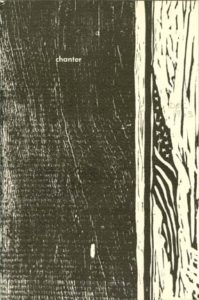
Post About “Black Man’s Burden”
This text is part of a collection of student work from the Fall 2017 class HIST 294-04/AMST 294-01, Public History: African American Life — Past, Present and Future. Students selected, described, and analyzed items from the Macalester Archives pertaining to Black history. The entire class collection can be found here.
The piece “Black Man’s Burden” is a short 5 page creative essay by Yolanda Louise Ridley published in pages 1-5 of the December 1963 edition of Chanter, Macalester’s longest running literary magazine. The issue is printed professionally and composed like a small magazine, with a cover and introduction and dedication pages. Chanter receives and publishes Macalester student artistic and literary work, and this piece can be found in the Chanter Collection. The piece follows Ridley’s exploration of the Civil Right’s politics of the time, written for her fellow peers at Macalester, the general audience for Chanter.
The first part of the story is an anecdote detailing a traumatic experience in Ridley’s life as a black child in the South in which her adult white male neighbor kills her kitten in front of her eyes when it wanders onto his porch, claiming he does this because she is “a little n***** girl.” She then compares this to her mother’s experiences driving in the South and the experience of an unnamed black girl elected Homecoming Queen at a school in the North, where the white men in the crowd refused to dance with her. The rest of the piece details how she thinks the hatred that black individuals develop for white people, while understandable as a means of adaptation, shouldn’t be encouraged. While agreeing there “is a debt to be paid” (3) by white people, she claims that black people must not also resort to hatred, as espoused by “the Black Muslims” (4). She wonders why it is bad for her to want to be liked by white people. To her, it is the Black Man’s Burden to end racism peaceably because, as she puts it, “One day he [the black man] will probably hold the fate of the world in his hands” (5). Finally, she concludes by stating that she worries black people are becoming too adept at adopting the “ugly parts” of western culture and wielding power; that black individuals shouldn’t be concerning themselves with “how to conjure up theories of race supremacy” (5). The story includes a small pencil illustration of a dead kitten being passed from large white hands to small open black ones.
This piece is very complicated and nuanced, and it is important that the time from which it was born is acknowledged. The author argues for the use of respectability politics, that in their political endeavors black individuals must not upset or anger their white oppressors. It is a classic “hate can’t fight hate” argument. This piece allows us to see how an individual black person at Macalester in the ‘60s had been affected by racism and white supremacy, and to see how she created a personal theory of change for confronting this racism. As a black woman at Macalester at this time, it likely served Ridley to engage in respectability politics in a predominately white atmosphere. In fact, in the ‘30s, Ridley’s mother, Henrietta Ridley (nee Bonaparte) had attended Macalester as the college’s only black student. In this piece then, we see the views of a second-generation Macalester-attending black woman. Perhaps she learned how to use respectability politics to navigate this space from her mother. Perhaps she didn’t, and she developed this on her own. Regardless, there is an element of heritage felt in this piece, particularly in the direct juxtaposition between her experiences with racism and those of her mother. With reference to the narratives presented, the reframing of the white man’s burden as the black man’s burden speaks volumes. Yolanda Louise Ridley, drawing upon her own experiences with traumatic racist events, fears that black individuals will enact vengeance upon their white oppressors, and that it is their burden not to do so, to act without violence.
–Theodore Twidwell
“Henrietta Bonaparte Ridley.” Tributes. 7 November 2017. http://www.tributes.com/obituary/show/Henrietta-Bonaparte-Ridley-85081381.
Ridley, Yolanda Louise. December 1963. “Black Man’s Burden.” Chanter: 1-5. Chanter Collection. Macalester College Archives.
MetadataTitle: Post About 'Black Man's Burden'
Creator: Twidwell, Theodore
Description: This text is part of a collection of student work from the Fall 2017 class HIST 294-04/AMST 294-01, Public History: African American Life — Past, Present and Future. Students selected, described, and analyzed items from the Macalester Archives pertaining to Black history. The entire class collection can be found in the Fall 2017 Public History Class tag.
Date Created:
Dates of Content: December, 1963
Type of Content: Text
Source: Ridley, Yolanda Louise. December 1963. “Black Man’s Burden.” Chanter: 1-5. Chanter Collection. Macalester College Archives.
URL: https://dwlibrary.macalester.edu/counterbalance/student-projects/black-mans-burden/
Suggested Citation: Twidwell, Theodore. "Post About 'Black Man's Burden'." Counterbalance, Macalester College Archives. . Text. https://dwlibrary.macalester.edu/counterbalance/student-projects/black-mans-burden/.